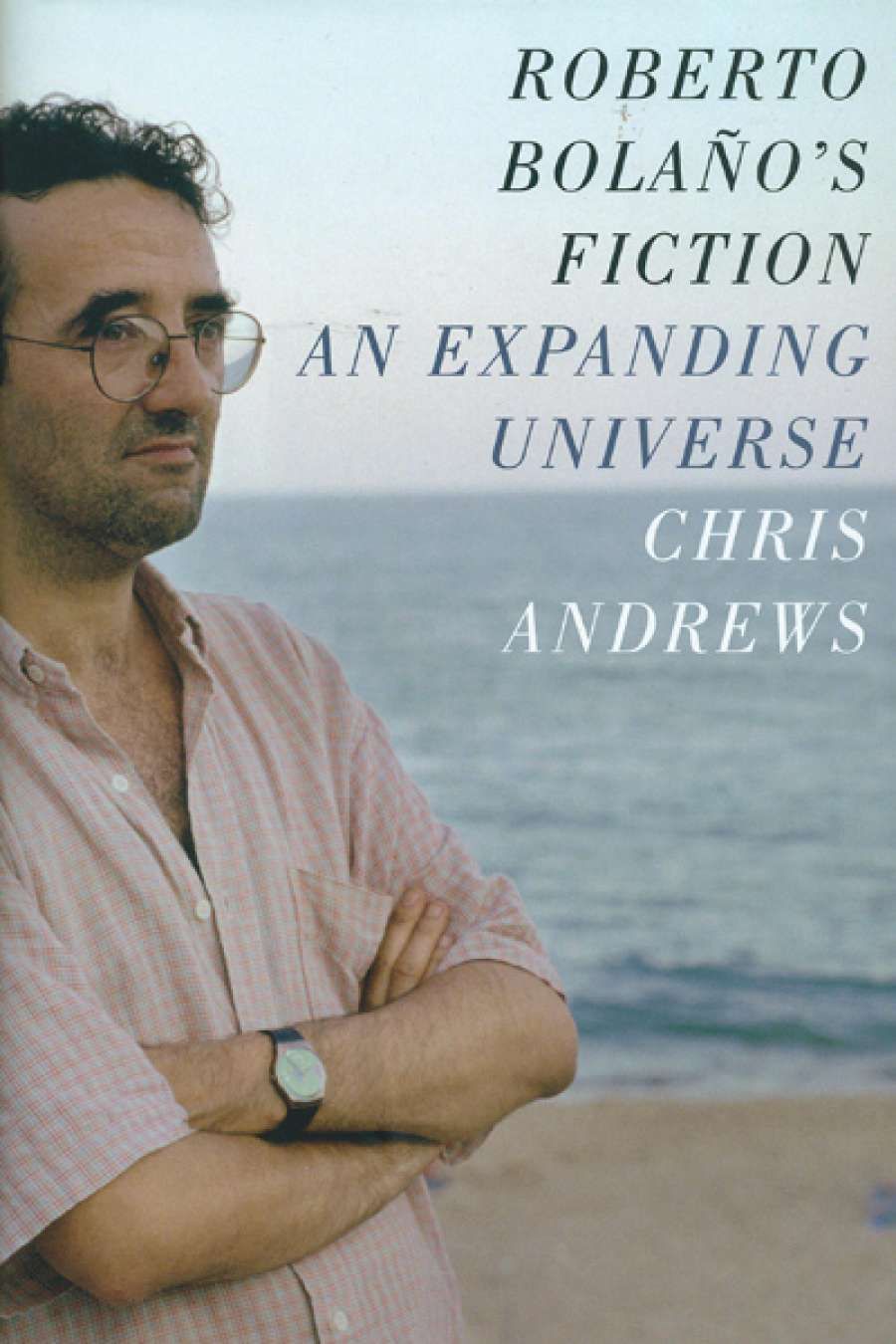
- Free Article: No
- Contents Category: Literary Studies
- Custom Article Title: Lara Anderson reviews 'Roberto Bolaño's Fiction' by Chris Andrews
- Book 1 Title: Roberto Bolaño's Fiction
- Book 1 Subtitle: An Expanding Universe
- Book 1 Biblio: Columbia University Press, $45.95 hb, 299 pp, 9780231168069
Twentieth-century Latin American literature is often reduced to the fusion of the real and the fantastic – the well-rehearsed trademark of literary giants such as Julio Cortázar and Gabriel García Márquez. But if García Márquez and Bolaño are comparable in terms of the magnitude of their commercial success and critical acclaim, that’s where the similarities end. As Andrews tells us, Bolaño could not have been any clearer in his disavowal of any connection between his writing and that ‘of the fathers (and some grandfathers)’. Not only did he launch a series of personal insults against many of the so-called boom writers, he also saw them as having ‘created a serious aesthetic problem … [that] had led Latin American Fiction into a dead end’.
Andrews’s superbly written and meticulously researched book is divided into seven chapters. The first looks at the anomalous success of Bolaño’s fiction, while the remaining six explore some of the most important features of the worlds constructed therein. Andrews’s outline of what motivates Bolaño’s immense popularity with English-speaking readers is fascinating. The most important factor, he writes, is that Bolaño is an exceptional writer. Yet, though Andrews is clear about Bolaño’s greatness, he also recognises the comparative ease with which male writers find themselves ‘taken seriously and qualified as great’. I was pleased (and slightly relieved) to read this reflection on the gendering of literary greatness and distinguished literary prizes. Another factor appealing to Bolaño’s English-speaking fans is the fact that his work is eminently translatable. It ‘better withstands translation’, Andrews relates, than fiction that relies on wordplay or sound patterning.
 Roberto Bolaño
Roberto Bolaño
Bolaño was nothing if not prolific, especially in the last ten years of his life, which is when the bulk of his massive opus was produced. It is the fact that he was able to match such productivity with genuine inventiveness that Andrews sets out to explore in Chapter Two. Expansion is the most fascinating of the techniques discussed here, in that it allowed Bolaño to revisit previous texts and expand them from within. Characters also circulate from one text to another, yet are sometimes renamed or transfigured. The question of the tension between commercial success and critical acclaim also occupies Andrews’s reading of Bolaño’s oeuvre. Many modern novelists have viewed narrative tension as ‘a tedious obligation’. Yet narrative tension is an important feature of Bolaño’s short stories and serves to maintain a reader’s sense of anticipation. In Bolaño’s long novels, narrative tension is interestingly decentralised through the use of linked stories.
‘Bolaño’s narrative world is frequently concerned with evil and the agents involved in its unfathomable perpetration’
Andrews’s chapter on evil agencies is of great interest and, for me, recalls our shared teaching and supervision on cultural production and Hispanic dictators. Evil is a category that Andrews relates to the figures of the dictator and the sociopath in Bolaño’s fiction – figures who are ‘intent not just on dominating the lives of others but also on destroying them’ – and Andrews discusses satire as a technique that Bolaño deploys to act as a kind of moral corrective to the atrocities they committed. The other two agents explored by Andrews are the accomplice and the administrator. Bolaño’s treatment of these figures is a powerful reminder of how the fear of torture and death will cause normally good people to pretend ignorance of the persecution of victims. Thus, as Andrews explains in the last chapter of the book, the construction of ‘ethically and politically oriented worlds’ is an important feature of Bolaño’s fiction.
In Andrews’s book, Bolaño’s texts take centre stage. When Andrews draws on complex theory to elucidate his analysis of Bolaño, it is done elegantly, often implicitly, and always with a clear eye for the centrality of Bolaño and his texts. It is clear that Roberto Bolaño’s Fiction: An Expanding Universe positions Andrews as a pioneer in Hispanic Studies. Quite remarkable, really, to think that he is also a scholar of great note in French Studies, an award-winning translator, and a celebrated poet in his own right.


Comments powered by CComment